
Barcode: 4061458018357
Schwäbische Maultaschen mit Gemüse-Füllung
HALAL
📝 Reason: The product is primarily plant-based with no Haram ingredients identified. However, the absence of Halal certification for egg-derived ingredients introduces doubt. According to Islamic dietary laws, all ingredients must be clearly Halal, especially those derived from animals. The presence of Doubtful ingredients affects the overall Halal status, making it Doubtful.
📄 Certificates: None
Ingredients:
Details
Understanding the Halal Status of Schwäbische Maultaschen mit Gemüse-Füllung
When it comes to food, ensuring compatibility with dietary restrictions is essential, especially for those observing Halal dietary guidelines. One such product is Schwäbische Maultaschen mit Gemüse-Füllung. This article delves into its Halal status, examining the ingredients and their origins, as well as the implications for consumers.
Product Overview
Schwäbische Maultaschen mit Gemüse-Füllung is a traditional German dish that features a pasta pocket filled with vegetables. The primary appeal of this dish lies not only in its flavor but also in its convenience for those seeking vegetarian and potentially Halal options.
Ingredient Analysis
The ingredients listed for Schwäbische Maultaschen mit Gemüse-Füllung include:
- Gemüsemischung (Potatoes, Carrots, Spinach, Onions, Leeks)
- Hartweizengrieß (Wheat semolina)
- Eiweiß aus Hühnerei (Egg white from chicken egg)
- Vollei (Whole egg)
- Weißbrot (White bread made from wheat flour, water, salt, yeast)
- Trinkwasser (Drinking water)
- Stärke (Starch)
- Speisesalz (Table salt)
- Gewürze (Spices, contains celery)
- Stabilisator (Sodium acetates, sodium citrates, ascorbic acid)
Halal Status of Ingredients
Now, let’s analyze each component to assess its Halal status:
- Gemüsemischung (Vegetable Mixture): This mix contains potatoes, carrots, spinach, onions, and leeks. All of these are generally considered Halal and plant-based.
- Hartweizengrieß (Wheat Semolina): Semolina obtained from wheat is Halal.
- Eiweiß aus Hühnerei & Vollei (Egg White and Whole Egg): Here lies the main concern. Both these ingredients raise doubts regarding their Halal status as they are derived from chicken, and without explicit Halal certification, they are classified as Doubtful.
- Weißbrot: The components of white bread—wheat flour, water, salt, and yeast—are all Halal.
- Trinkwasser (Drinking Water): Water is Halal.
- Stärke (Starch): Sourced from plant-based materials, it is Halal.
- Speisesalz (Table Salt): Always Halal.
- Gewürze (Spices): Even with celery included, spices are generally Halal.
- Stabilisator (Stabilizers): This includes sodium acetates, citrates, and ascorbic acid, all of which are Halal.
Implications of the Halal Status
The presence of the egg-derived ingredients without Halal certification poses a critical question for consumers concerned about Halal compliance. According to Islamic dietary laws, for an item to be deemed Halal, all of its components must be clearly identified as such, especially those sourced from animals.
While the majority of the Schwäbische Maultaschen ingredients are Halal, the uncertainty surrounding the egg components brings the overall Halal status into doubt. Therefore, potential consumers should consider this carefully before making their purchase.
Final Thoughts
In conclusion, Schwäbische Maultaschen mit Gemüse-Füllung offers an intriguing option for those who enjoy meatless meals. However, given the lack of Halal certification for its egg ingredients, consumers should proceed with caution. The Halal status is currently categorized as Doubtful. If strict adherence to Halal dietary laws is required, it may be wise to seek alternatives or inquire directly with the manufacturer for clarification.
For more inquiries or dietary discussions, consult local Halal certification bodies or resources to ensure your food choices are aligned with your beliefs.

